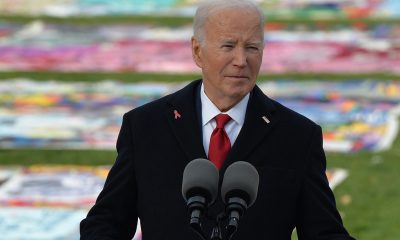Arts & Entertainment
A non-binary Cuban artist is born again in Spain
Nonardo Perea suffered persecution in his homeland
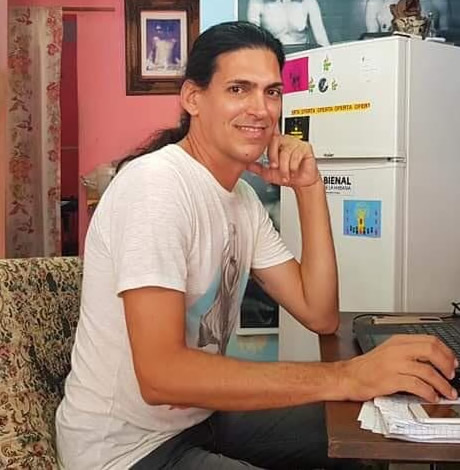
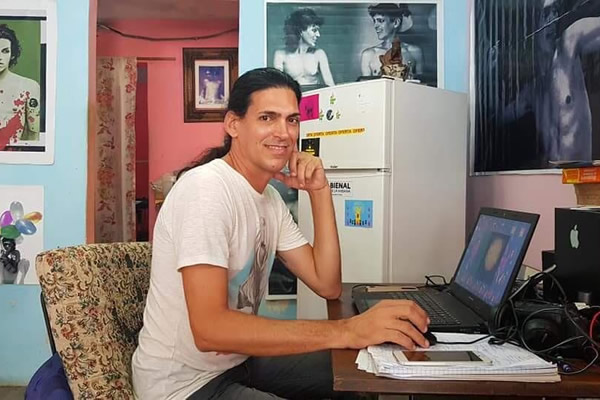
Nonardo Perea lives in Michel’s body. He uses it at will to be vulgar, angelic or diabolical, male or female. Nonardo can be whatever he wants. Michel, shy and withdrawn, hides behinds that alter ego that lends him his face and hands to show the world his claims as an artist.
Nonardo is an invention that comes to life in photographs, video art, performances, stories, installations, journalistic articles, ceramics, and whatever other format is possible, since Nonardo long ago lost any limits. His mind lost that ability as he reinvented himself as an empirical artist, as no one ever gave him the opportunity to attend art school.
He has been greatly misunderstood, mainly because his pieces overflowed with eroticism and Cuba is still too prudish to appreciate his queer art and his other works the regime has labeled as “politically incorrect.” Michel and Nonardo were discriminated against by society and the dictatorship that governs the country and represses anyone who does not agree with its dogmas.
Nonardo nevertheless overcame those barriers and began creating, without anyone’s guidance. He was first a writer and received some tools once he graduated from the Onelio Jorge Cardoso Literary Training Center in Havana. He won several competitions, such as the 2017 Franz Kafka Prize for his work “Los amores ejemplares” and the 2012 Félix Pita Rodríguez Prize for the novel “Donde el diablo puso la mano.”
In the visual arts, where he is usually very restless, he won the third prize for photography at the GendErotica Festival for “La casa por la ventana 2014” with his Vulgarmente Clásica project. He participated in the Bienal 00, organized by independent artists, with his “En la cama con Nonardo” project and presented Vulgarmente Clásica at Madrid’s La Neomudéjar Museum in 2019.
Nonardo belongs to the San Isidro Movement, a group of independent artists and intellectuals who fight for a democratic Cuba. That battle has also been fought through his art and in pursuit of LGBTQ rights, such as marriage and adoption rights for same-sex couples, and an end to gender violence that remains a problem on the island.
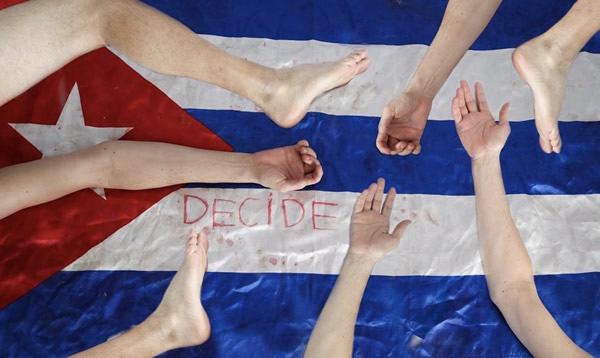
Due to his work and political activism for a truly democratic Cuba, Nonardo suffered police harassment and Cuban state security agents threatened him with jail. Fearing for his life, he took refuge in Spain, a country where he feels he has been reform and from which he speaks with the Washington Blade.
WASHINGTON BLADE: Those who follow your art on social networks and off of them know you as Nonardo, but few know that your real name is Michel. How and why was Nonardo Perea born?
NONARDO PEREA: I remember starting my writing career and I needed another name that was not so common. I did a big search and I didn’t like any of them. I wanted a unique name if possible. One afternoon I was sitting in the living room of my house with my father and I told him about the need for a name. It was he who proposed Nonardo. At first it sounded a bit ugly to me, but then with Perea it seemed a little better. It had strength. I liked it because it began with “no”, denial, and was followed by “nardo”, flower, that is, Nonardo had a lot to do with me. Since then I started using it for all of my work, both literary and audiovisual.
BLADE: How does your artistic training take into account that you are an empirical creator?
PEREA: My artistic creation from the beginning was always very complicated, taking into account that I had to abandon my studies at an early age for inclusion reasons, so I have no academic training; then add to that that I am a very obvious gay. At one point in my teens I was seen as a person who was too feminine. The fact of looking like a woman was a problem when trying to fit in a macho and homophobic society. Where I first tried to break through was in writing. I started by attending literary workshops, where I won several contests quite quickly. I was never exempt from criticism and rejection of the themes that my narrations addressed, which almost always focused on LGBTQ issues and dirty realism. Many times I felt that being the way I am made many uncomfortable. But despite the rejections and bad times that I lived in various periods of my life, I continued doing narrative, and I also began to write articles about social issues for the Havana Times digital newspaper. Then, over time, I had the opportunity to apply to a video journalism workshop in Prague organized by the People in Need organization, and thanks to a woman I love very much, Clara González, who saw some potential in me, I was accepted to participate in the course, in which I learned some video editing, and received help with equipment that helped me to start doing audiovisual work with better quality. All my creative works have been done empirically, and above all I am an artist who works based on improvisation.
BLADE: You have ventured into artistic genres as different as writing, journalism and acting. How do you define yourself as an artist and why?
PEREA: I am a person who cannot be inactive. I spend every day of my life thinking about doing something new. Sometimes I have so many things on my mind, and the fact that I can’t do everything I want to do makes me feel a bit frustrated. I have no words to define myself, I can only say that in some way my creative processes have helped me to cope with the life that I had to live, everything I have done and do has served as a way of escape from reality and everyday life, I could no longer live without creating.
BLADE: In a recent interview you precisely declared that your art was a process of liberating yourself. What exactly do you free yourself from when you create?
PEREA: I free myself from the day-to-day, the everyday, my fears and censorship.
BLADE: In most of your visual works you work with your own image. Why?
PEREA: I use myself as an artistic object because in Cuba I lived in solitude for a long time. I somehow isolated myself and created a space of comfort in my home, a place where I felt more free. The confinement somehow helped me to stay away from society that did not tire of making me feel bad about my obvious homosexual condition in much of my youth. My literary proposals and art in general, on the other hand, were not taken into account. I always perceived that most people underestimated me, and proposing someone to collaborate with me on erotic photographs without receiving anything in return was complicated, and still is. I have control over my body. If I want to undress in a photo or in a video, even if I feel sorry, I strip myself of complexes and do it. If I want to take a photograph that is too vulgar, I also do it. I do not have to request permission from anyone to do so. I don’t put up barriers. I take a risk, then I think that they say what they want. I understand that I am doing a job where I express my personal and social problems, as a human being.
BLADE: You identify yourself as an androgynous person. How many difficulties has that brought you considering that you have lived most of your life and developed your work in Cuba, a country where macho and homophobic ideals still predominate?
PEREA: I consider myself a non-binary androgynous person, because I do not identify with any sex. I can feel at ease as a girl as well as a boy. I have no problem with male or female pronouns. I do not like to victimize myself, but I can tell you that the road has been very difficult, and it has been not only for me, but for many other gays and lesbians who have chosen not to hide their sexual identity in their lives and have had to fight against the world. Being who I am in Cuba has not helped me much in terms of being able to be recognized for my work, but being who I am has helped me to strengthen myself and to understand that I do not need the approval of any institution to continue creating. I am a Cuban artist and like it or not, a large part of my work was created in Cuba.
BLADE: Many Cuban artists prefer to separate their creations from politics and even refuse to give their true judgment on the situation on the island. However, your work has a high dose of activism against the dictatorship and in defense of LGBTQ rights. What consequences, professional and personal, has being an artist labeled by the Cuban regime as “counterrevolutionary” brought you?
PEREA: The main consequence is that I had to go into exile; leave the country where I was born, abandon my mother and family, my friends, my dogs and a lifetime. But I think it had to be that way. There was no other way than to say goodbye, because under no circumstances was I going to allow my creative processes to stop, and above all I was going to continue doing my activism. I know that perhaps I was not going to be able to withstand so much pressure from state security agents, who wanted me to collaborate with them to expose my colleagues from the San Isidro Movement. If I returned to Cuba right now, I don’t know what my life would have been like from that moment on. If being a counterrevolutionary means saying what I think, and being in favor of oppressed minorities, and being against a dictatorship that has left Cuba and its people in a nameless misery for 61 years, then I am a counterrevolutionary and with great honor. I have nothing for which to thank that country, where I was always seen as a freak, and what little I got was thanks to my effort and dedication, because while in Cuba I received criticism and obstacles for everything, for this reason they are collecting what they sowed with me, they do not expect roses from me.
BLADE: In Cuba, to be accepted as part of the official LGBTQ movement you have to share the ideology of the dictatorship, the same one that put equal marriage to a popular vote and represses independent activists. In your opinion, what are the dangers of “politicizing” the struggle of the Cuban gay movement?
PEREA: The danger is in seeing how it becomes politicized. While in Cuba, I never stopped going to the marches staged by CENESEX (the National Center for Sexual Education) and I will not forget how Mariela Castro (CENESEX’s director and the daughter of former Cuban President Raúl Castro) herself politicized those mini-carnival marches with slogans in favor of the five spies imprisoned in the Empire (a reference to the U.S.), and with cries of “socialism yes and homophobia no.” I do not remember seeing any gay or lesbian carrying a sign demanding equal marriage, or demanding freedoms, or a law against gender violence. It is really pathetic considering that the system itself is the number one cause of the persistence of homophobia and constant abuse of people from the community, mainly transgender people, in Cuba, a country where your rights are constantly violated, either because of race or sexual orientation. Those marches were politicized by CENESEX itself in favor of a supposed socialism, which has never worked and will never work because that is a hybrid between communism and underdeveloped capitalism, and we all know that it is nothing other than a dictatorship, and of the crudest in history because it has managed to last for 61 years. If Mariela Castro and all her loyal followers politicize the march for their benefit, I don’t see why the community cannot independently arm its own fight in favor of the most basic rights of the LGBTQ community in Cuba.
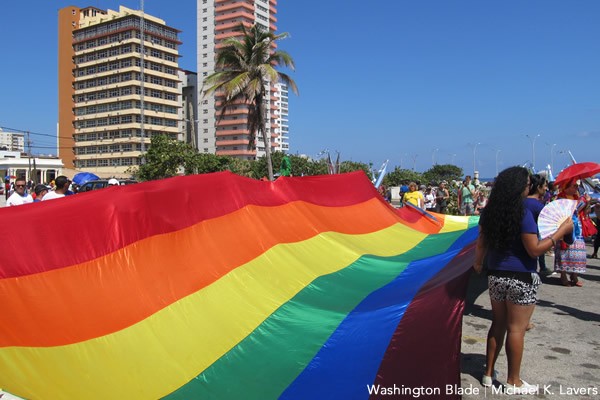
BLADE: In what way has the forced exile that you have faced in Spain changed your work?
PEREA: Right now I continue to do what I want to do, regardless of being in Spain. I still feel that I am in Cuba. My vision as an artist has not changed much. I’ve only been here a year and seven months, although I believe that wherever I am, in some way my work will be linked to that of the island because I have not yet cut that umbilical cord that links me to the place where I was born and took my first steps. It is true that one acquires other mechanisms of creation and invoicing in the work while abroad, but at the moment I do not think that the focus of my work has changed much because of being in another country. Of course, here in Europe there are other problems that I may be able to take advantage of, but be that as it may, they will be appreciated from the perspective of an exiled Latin American artist.
BLADE: On a personal level, what has it been like to be a gay immigrant in Europe?
PEREA: I am very grateful for Spain, mainly for Madrid, which is the place where I have lived since I arrived in 2019. At the moment, I have not felt discriminated against because of my sexual orientation or because I am a foreigner. I have received emotional and legal support from the NGO Rescate, which welcomed me and where I have received the care that I never had in my own country. With all the social and political problems that may exist, it is in this country where I have somehow been able to know what true freedom is.
BLADE: What can we expect from Nonardo Perea in the near future?
PEREA: I am in another difficult moment in my life right now, because I cannot find a job, and I do not receive any money for my artistic work, so what I do is for the love of art and because I cannot stop building my own world. The COVID situation has managed to make things more difficult, not only for me but for everyone, but taking into account that I am an exile and that I have been here for a short time, it is very complicated. Even so, I eventually continue to make video art for the Vulgarmente Clásica audiovisual project, which I have been doing for several years. And more recently I started with a new project, “Maricón Tropical: Living in Madrid”, this one is a bit more comprehensive not to call it ambitious because I insert various artistic manifestations: Performance, audiovisual, literature, drawing and photography, and it is focused on my new life as an exile in Madrid, everything seen from a self-referential point of view, as are almost all my proposals.
BLADE: If you had to create a work that describes your life right now, what would it be like?
PEREA: I consider that my life, my true life, has started now, what it was before was not. For the purposes I was born on March 19, 2019, when I set foot in Spain. All the past is left behind. I want to imagine that the past was a bad dream. My “Maricón Tropical: Living in Madrid” project is a work that somehow reflects that past, which is unfortunately impossible to forget and it is also good that people know what that other life was like, but I focus more on the present, my current problems as a person who faces a new life as an adult who feels like a newborn. I can only tell you that my life’s work is in progress.
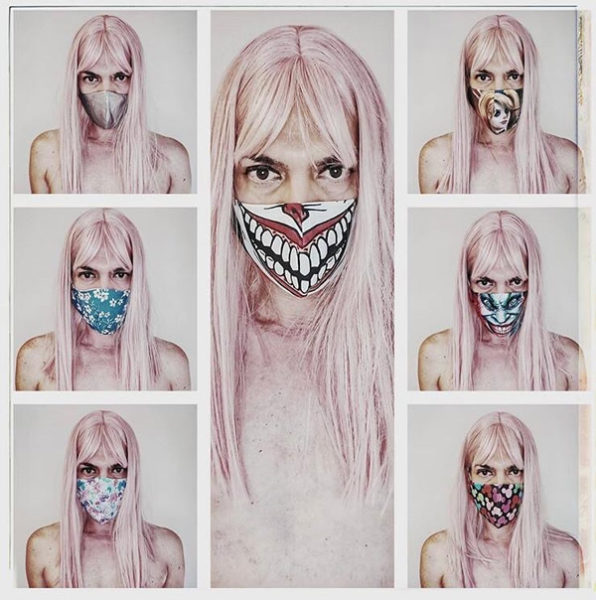

Friday, Feb. 20
Center Aging Monthly Luncheon with Yoga will be at noon at the D.C. LGBTQ+ Community Center. Email Mac at [email protected] if you require ASL interpreter assistance, have any dietary restrictions, or questions about this event.
Trans and Genderqueer Game Night will be at 7 p.m. at the D.C. Center. This will be a relaxing, laid-back evening of games and fun. All are welcome! We’ll have card and board games on hand. Feel free to bring your own games to share. For more details, visit the Center’s website.
Go Gay DC will host “First Friday LGBTQ+ Community Social” at 7 p.m. at Hotel Zena. This is a chance to relax, make new friends, and enjoy happy hour specials at this classic retro venue. Attendance is free and more details are available on Eventbrite.
Saturday, Feb. 21
Go Gay DC will host “LGBTQ+ Community Brunch” at 11 a.m. at Freddie’s Beach Bar & Restaurant. This fun weekly event brings the DMV area LGBTQ community, including allies, together for delicious food and conversation. Attendance is free and more details are available on Eventbrite.
LGBTQ People of Color will be at 7 p.m. on Zoom. This peer support group is an outlet for LGBTQ People of Color to come together and talk about anything affecting them in a space that strives to be safe and judgement free. There are all sorts of activities like watching movies, poetry events, storytelling, and just hanging out with others. For more information and events, visit thedccenter.org/poc or facebook.com/centerpoc.
Sunday, Feb. 22
Queer Talk DC will host “The Black Gay Flea Market” at 1 p.m. at Doubles in Petworth. There will be more than 15 Black queer vendors from all over the DMV in one spot. The event’s organizers have reserved the large back patio for all vendors, and the speak easy for bar service, which will be serving curated cocktails made just for the event (cash bar.) DJ Fay and DJ Jam 2x will be spinning the entire event. For more details, visit Eventbrite.
Monday, Feb. 23
“Center Aging: Monday Coffee Klatch” will be at 10 a.m. on Zoom. This is a social hour for older LGBTQ adults. Guests are encouraged to bring a beverage of choice. For more information, contact Adam at [email protected].
Tuesday, Feb. 24
Coming Out Discussion Group will be at 7 p.m. on Zoom. This is a safe space to share experiences about coming out and discuss topics as it relates to doing so — by sharing struggles and victories the group allows those newly coming out and who have been out for a while to learn from others. For more details, visit the group’s Facebook.
Genderqueer DC will be at 7 p.m. on Zoom. This is a support group for people who identify outside of the gender binary, whether you’re bigender, agender, genderfluid, or just know that you’re not 100 percent cis. For more details, visit genderqueerdc.org or Facebook.
Wednesday, Feb. 25
Job Club will be at 6 p.m. on Zoom upon request. This is a weekly job support program to help job entrants and seekers, including the long-term unemployed, improve self-confidence, motivation, resilience and productivity for effective job searches and networking — allowing participants to move away from being merely “applicants” toward being “candidates.” For more information, email [email protected] or visit thedccenter.org/careers.
Asexual and Aromantic Group will meet at 7 p.m. on Zoom. This is a space where people who are questioning this aspect of their identity or those who identify as asexual and/or aromantic can come together, share stories and experiences, and discuss various topics. For more details, email [email protected].
Thursday, Feb. 26
The DC Center’s Fresh Produce Program will be held all day at the DC Center. To be more fair with who is receiving boxes, the program is moving to a lottery system. People will be informed on Wednesday at 5 p.m. if they are picked to receive a produce box. No proof of residency or income is required. For more information, email [email protected] or call 202-682-2245.
Virtual Yoga Class will be at 7 p.m. on Zoom. This free weekly class is a combination of yoga, breathwork and meditation that allows LGBTQ community members to continue their healing journey with somatic and mindfulness practices. For more details, visit the DC Center’s website.
Sports
US wins Olympic gold medal in women’s hockey
Team captain Hilary Knight proposed to girlfriend on Wednesday

The U.S. women’s hockey team on Thursday won a gold medal at the Milan Cortina Winter Olympics.
Team USA defeated Canada 2-1 in overtime. The game took place a day after Team USA captain Hilary Knight proposed to her girlfriend, Brittany Bowe, an Olympic speed skater.
Cayla Barnes and Alex Carpenter — Knight’s teammates — are also LGBTQ. They are among the more than 40 openly LGBTQ athletes who are competing in the games.
The Olympics will end on Sunday.
Movies
Radical reframing highlights the ‘Wuthering’ highs and lows of a classic
Emerald Fennell’s cinematic vision elicits strong reactions

If you’re a fan of “Wuthering Heights” — Emily Brontë’s oft-filmed 1847 novel about a doomed romance on the Yorkshire moors — it’s a given you’re going to have opinions about any new adaptation that comes along, but in the case of filmmaker Emerald Fennell’s new cinematic vision of this venerable classic, they’re probably going to be strong ones.
It’s nothing new, really. Brontë’s book has elicited controversy since its first publication, when it sparked outrage among Victorian readers over its tragic tale of thwarted lovers locked into an obsessive quest for revenge against each other, and has continued to shock generations of readers with its depictions of emotional cruelty and violent abuse, its dysfunctional relationships, and its grim portrait of a deeply-embedded class structure which perpetuates misery at every level of the social hierarchy.
It’s no wonder, then, that Fennell’s adaptation — a true “fangirl” appreciation project distinguished by the radical sensibilities which the third-time director brings to the mix — has become a flash point for social commentators whose main exposure to the tale has been flavored by decades of watered-down, romanticized “reinventions,” almost all of which omit large portions of the novel to selectively shape what’s left into a period tearjerker about star-crossed love, often distancing themselves from the raw emotional core of the story by adhering to generic tropes of “gothic romance” and rarely doing justice to the complexity of its characters — or, for that matter, its author’s deeper intentions.
Fennell’s version doesn’t exactly break that pattern; she, too, elides much of the novel’s sprawling plot to focus on the twisted entanglement between Catherine Earnshaw (Margot Robbie), daughter of the now-impoverished master of the titular estate (Martin Clunes), and Heathcliff (Jacob Elordi), a lowborn child of unknown background origin that has been “adopted” by her father as a servant in the household. Both subjected to the whims of the elder Earnshaw’s violent temper, they form a bond of mutual support in childhood which evolves, as they come of age, into something more; yet regardless of her feelings for him, Cathy — whose future status and security are at risk — chooses to marry Edgar Linton (Shazad Latif), the financially secure new owner of a neighboring estate. Heathcliff, devastated by her betrayal, leaves for parts unknown, only to return a few years later with a mysteriously-obtained fortune. Imposing himself into Cathy’s comfortable-but-joyless matrimony, he rekindles their now-forbidden passion and they become entwined in a torrid affair — even as he openly courts Linton’s naive ward Isabella (Alison Oliver) and plots to destroy the entire household from within. One might almost say that these two are the poster couple for the phrase “it’s complicated.” and it’s probably needless to say things don’t go well for anybody involved.
While there is more than enough material in “Wuthering Heights” that might easily be labeled as “problematic” in our contemporary judgments — like the fact that it’s a love story between two childhood friends, essentially raised as siblings, which becomes codependent and poisons every other relationship in their lives — the controversy over Fennell’s version has coalesced less around the content than her casting choices. When the project was announced, she drew criticism over the decision to cast Robbie (who also produced the film) opposite the younger Elordi. In the end, the casting works — though the age gap might be mildly distracting for some, both actors deliver superb performances, and the chemistry they exude soon renders it irrelevant.
Another controversy, however, is less easily dispelled. Though we never learn his true ethnic background, Brontë’s original text describes Heathcliff as having the appearance of “a dark-skinned gipsy” with “black fire” in his eyes; the character has typically been played by distinctly “Anglo” men, and consequently, many modern observers have expressed disappointment (and in some cases, full-blown outrage) over Fennel’s choice to use Elordi instead of putting an actor of color for the part, especially given the contemporary filter which she clearly chose for her interpretation for the novel.
In fact, it’s that modernized perspective — a view of history informed by social criticism, economic politics, feminist insight, and a sexual candor that would have shocked the prim Victorian readers of Brontë’s novel — that turns Fennell’s visually striking adaptation into more than just a comfortably romanticized period costume drama. From her very opening scene — a public hanging in the village where the death throes of the dangling body elicit lurid glee from the eagerly-gathered crowd — she makes it oppressively clear that the 18th-century was not a pleasant time to live; the brutality of the era is a primal force in her vision of the story, from the harrowing abuse that forges its lovers’ codependent bond, to the rigidly maintained class structure that compels even those in the higher echelons — especially women — into a kind of slavery to the system, to the inequities that fuel disloyalty among the vulnerable simply to preserve their own tenuous place in the hierarchy. It’s a battle for survival, if not of the fittest then of the most ruthless.
At the same time, she applies a distinctly 21st-century attitude of “sex-positivity” to evoke the appeal of carnality, not just for its own sake but as a taste of freedom; she even uses it to reframe Heathcliff’s cruel torment of Isabella by implying a consensual dom/sub relationship between them, offering a fragment of agency to a character typically relegated to the role of victim. Most crucially, of course, it permits Fennell to openly depict the sexuality of Cathy and Heathcliff as an experience of transgressive joy — albeit a tormented one — made perhaps even more irresistible (for them and for us) by the sense of rebellion that comes along with it.
Finally, while this “Wuthering Heights” may not have been the one to finally allow Heathcliff’s ambiguous racial identity to come to the forefront, Fennell does employ some “color-blind” casting — Latif is mixed-race (white and Pakistani) and Hong Chau, understated but profound in the crucial role of Nelly, Cathy’s longtime “paid companion,” is of Vietnamese descent — to illuminate the added pressures of being an “other” in a world weighted in favor of sameness.
Does all this contemporary hindsight into the fabric of Brontë’s epic novel make for a quintessential “Wuthering Heights?” Even allowing that such a thing were possible, probably not. While it presents a stylishly crafted and thrillingly cinematic take on this complex classic, richly enhanced by a superb and adventurous cast, it’s not likely to satisfy anyone looking for a faithful rendition, nor does it reveal a new angle from which the “romance” at its center looks anything other than toxic — indeed, it almost fetishizes the dysfunction. Even without the thorny debate around Heathcliff’s racial identity, there’s plenty here to prompt purists and revisionists alike to find fault with Fennell’s approach.
Yet for those looking for a new window into to this perennial classic, and who are comfortable with the radical flourish for which Fennell is already known, it’s an engrossing and intellectually stimulating exploration of this iconic story in a way that exchanges comfortable familiarity for unpredictable chaos — and for cinema fans, that’s more than enough reason to give “Wuthering Heights” a chance.
-

 Baltimore5 days ago
Baltimore5 days ago‘Heated Rivalry’ fandom exposes LGBTQ divide in Baltimore
-

 Real Estate5 days ago
Real Estate5 days agoHome is where the heart is
-

 District of Columbia4 days ago
District of Columbia4 days agoDeon Jones speaks about D.C. Department of Corrections bias lawsuit settlement
-

 European Union4 days ago
European Union4 days agoEuropean Parliament resolution backs ‘full recognition of trans women as women’





